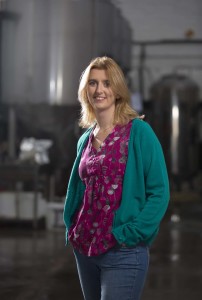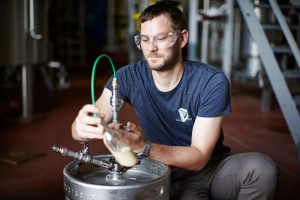Whichcraft
Double, double toil and trouble; fire burn and caldron bubble…. News that the Independent Craft Brewers of Ireland association will establish its own trademark to differentiate its members’ ‘craft beer’ brands from those produced by larger multinationals has led to mixed feelings and differing opinions on what constitutes an Irish ‘craft beer’.
Whatever your definition, ‘craft beer’ sales continue to grow, making craft beer’s presence felt on the Irish beer market.
Over 50 different microbreweries have helped grow the craft beer market by 18% set against a 3% decline in the beer market overall.
Independent Craft Brewers of Ireland’s outlook
As an organisation, the ICBI is interested in promoting this growth but also in ensuring transparency for consumers around the craft beers on offer.
“With a fledgling microbrewing industry in Ireland, we want to promote this and we don’t believe that macrobreweries masquerading brands as craft beer brands is something that’ll help our industry develop,” reasons Metalman’s Grainne Walsh.
In this she reflects the ICBI’s recent statement to Drinks Industry Ireland about the trademark development.
“We feel very strongly that if a person is choosing a beer because they believe it to be a craft beer produced in Ireland by an Irish microbrewery then there should be some way for them to confirm that this is the case without having to carry out investigative research on the name of the beer!
“The creation of a mark that our member breweries can use will demonstrate immediately to any consumer that the beer they’re drinking is indeed an Irish craft beer.”
But is being an independently-owned microbrewery in Ireland producing up to 30,000 hectolitres of beer per annum (and therefore eligible for the duty excise rebate) enough to delineate a craft beer as such?

“With a fledgling microbrewing industry in Ireland, we want to promote this and we don’t believe that macrobreweries masquerading brands as craft beer brands is something that’ll help our industry develop,” reasons Metalman’s Grainne Walsh.
Craft beer – says who?
“We want to ensure that breweries calling themselves ‘Irish craft breweries’ are indeed microbreweries under the Government definition of this,” explained Grainne, who heads up Waterford’s Metalman Brewery (which became the first microbrewery in Ireland to start its own canning line last year).
Can a global drinks company’s subsidiary call its beer products ‘craft’?
In the US, ‘craft’ beer now holds around 12% of the total beer market by volume and perhaps 20% by value.
The major breweries there have seen a decline in mainstream sales which some put down to the emergence of a stronger craft brewing market.
As a result, major breweries are taking the first steps into acquiring the craft brewing knack.
While some have simply gobbled-up entire craft breweries to compete in this market, others have tried to develop their own craft beers.
A craft beer by definition?
The challenge of defining a craft beer remains. There can be 10 different definitions of craft beer from 10 different people.
Take Heineken Ireland, for example. The Cork brewery answered our query simply stating: “It’s difficult to define what a craft beer is exactly. In fact, consumers themselves have very different views as to what a craft beer is. In general it’s probably an indigenous Irish product, either an ale, lager or stout, has a sense of place and has been crafted by using carefully-selected ingredients.”
Over at Diageo Ireland, where Hop House13 is in full swing, Masterbrewer Peter Simpson explained, “Craft beer is hard to pin down with a definition that everyone can agree on and to be honest, I think that trying to do so risks missing the point.
“What really matters is that we’re enjoying a genuine beer renaissance at the moment; people are interested in beer again, its ingredients, where it comes from, how it tastes, who made it and the stories behind it.
“This renaissance definitely had its origins in the craft beer movement in the US over the last few decades but the renewed vibrancy and innovation it has brought to the world of beer is now very much in evidence right across our industry.

“I’m genuinely excited to see how the craft beer movement has changed the way people think about, talk about and enjoy beer” – Peter Simpson.
“I’m genuinely excited to see how the craft beer movement has changed the way people think about, talk about and enjoy beer.
“It’s great news for anyone that works in brewing including my colleagues and I here at St James’s Gate, where the story of quality and innovation and passion for brewing spans our 256 years of history.
“The launch of The Brewers Project back in September celebrated this fact and since then we’ve been busy creating new beers.
“The great news is that this renewed interest in beer shows no signs slowing so you can expect more new beers from The Brewers Project in the months and years to come.”
Molson Coors constitutes one major brewer that simply purchased a microbrewery outright when it snapped up the Franciscan Well brewery in Cork.
“Craft beer is certainly something that’s difficult if not impossible to define, but everyone has an understanding,” says Robert Blythe, Director of Molson Coors’ Craft Beer business here and in the UK, “When I see and taste beer that has an authentic story, credible origins, with recipes that have been developed, honed and improved over time by talented and dedicated brewers, that – for me – is as good as it gets.
“That’s what craft means to me and it’s absolutely the philosophy I apply at Molson Coors. I don’t believe that craft beer should be defined by size. It should be defined by the credibility of the beer, the skill of the brewer, the brewery and the process that has gone into making it what it is. Bringing scale to a beer with an authentic origin means more people get to experience it – and that’s a very good thing.”
Little has changed since the takeover as far Franciscan Well’s Shane Long is concerned.
“Did I change overnight when Molson Coors bought the Franciscan Well business?” he asks, “Certainly not! We’re using the same process as before; in fact our batch size in our new Cork brewery is of similar size to breweries like O’Hara’s and Porterhouse and would be considerably smaller than UK or US players.
“I ‘crafted’ my trade over 17 years of trail, error, innovation and risk-taking. Guinness brewers are craftsmen having spent many years in college and more on apprenticeships.
How many Master Brewers are in today’s craft industry?” he aks.
And what defines him?
“A brewer with passion uncompromising when it comes to quality and constantly trying to improve,” he answers.
Breweries such as Rye River Brewery lie somewhere in between a microbrewery and a ‘macrobrewery’.
Rye River itself has applied for membership of the ICBI despite the fact that it hopes to be “knocking on the door of the 30,000hl mark by 2016”.
Rye River’s Niall Phelan reckons the ICBI’s trademark to be a good idea.
“It’s a good idea to identify good local independent Irish producers,” he says, “The big guys are going to do more of that and get into more acquisitions. I’d be surprised if 2015 passes without another such acquisition of a craft brewery”.
Personally, he says, he’s no problem with major breweries bringing out craft brands or ‘craft’ breweries making use of larger brewers initially.
He points out, “It takes between 12 and 18 months to get a new microbrewery going so contracting out to a major brewery is the norm.
“I just don’t think that the consumer really cares whether or not it’s a microbrewery or a larger operation,” he explains, “It’s pretty obvious that craft beer consumers are happy as long as the beer’s good”.
And many growing craft breweries would like to see that 30,000 hectolitre figure raised again by the Minister for Finance.
“In the UK, it’s 50,000 hl and it’s higher again in France for being a small brewer,” says Niall who’d like to see the Irish government raise the threshold to 60,000 or 70,000hl “…. as small breweries are still struggling to make decent money at 30,000hl”.
US craft brewers stimulated by Bud ad
Craft brewers merited dismissive mention in the recent Budweiser Superbowl advertising campaign where the brand distanced itself from the ‘pumpkin peach ale’-type brewers – a style of brewing most of the craft beer producers had never thought of.
However they have now — and are believed to be producing pumpkin peach ale beers in quite a few brew tanks as a result….








